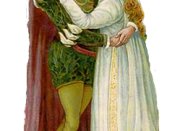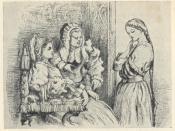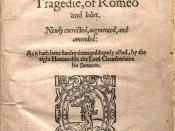"Romeo and Juliet" is one of Shakespeare's most famous and classical tragic plays where two young lovers are destined to be together but their families bitter hatred towards one another force them apart. They soon realize that one cannot live without the other and would rather be dead than live apart; so they end up committing suicide under tragic circumstances. Shakespeare wrote the play in 1959 and it was set in Italy. To understand the extent of tragedy in this play, the social and historical context of the play and other factors that may have contributed to the tragedy of the play, are very important. Most people see tragedy as a sudden unfortunate event, which leaves people sad, upset and possibly grieving. In a Shakespeare play tragedy is brought to the audience very differently. The definition of tragedy would be a disastrous event or calamity in which destructive circumstances result in the deaths of the main characters in question.
The audience in Shakespeare's play is made to feel fear, pity, emotion and a sense of a waste and loss of life. Shakespeare delivers this play's tragedy through many factors most of which are brought by fate and inevitability and others from those who took part in the events which lead to the end of Romeo and Juliet. His use of language, themes, imagery, motifs and symbols also have a profound effect on how he builds up the tragic circumstances in the play.
Shakespeare enhanced tragedy in this play by the loss of Romeo and Juliet's intense and passionate love affair. "O, speak again bright angel, for thou are as glorious to this night being over my head, as a winged messenger of heaven." (Act 2, Scene 2) These are the words of Romeo as he stands...


